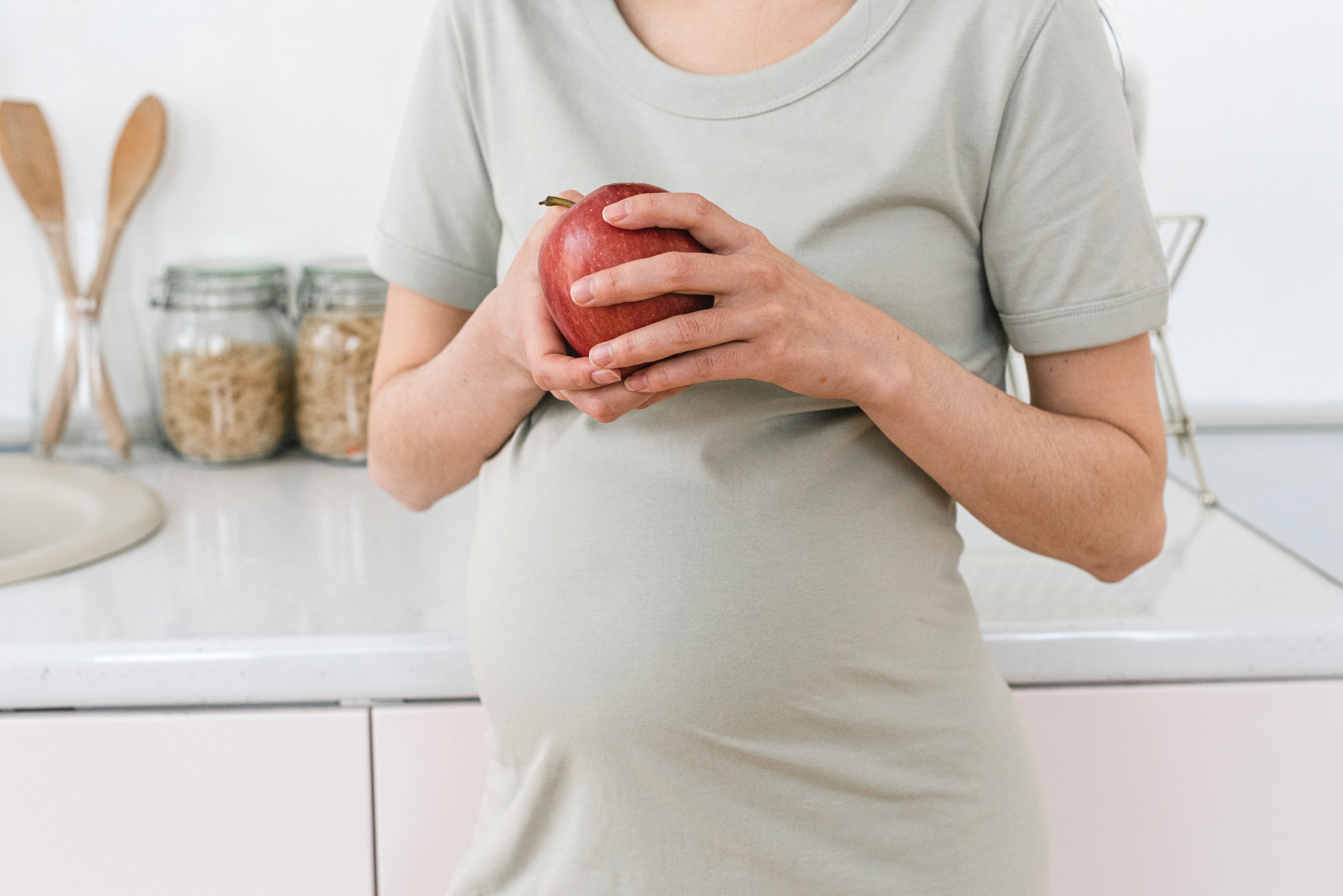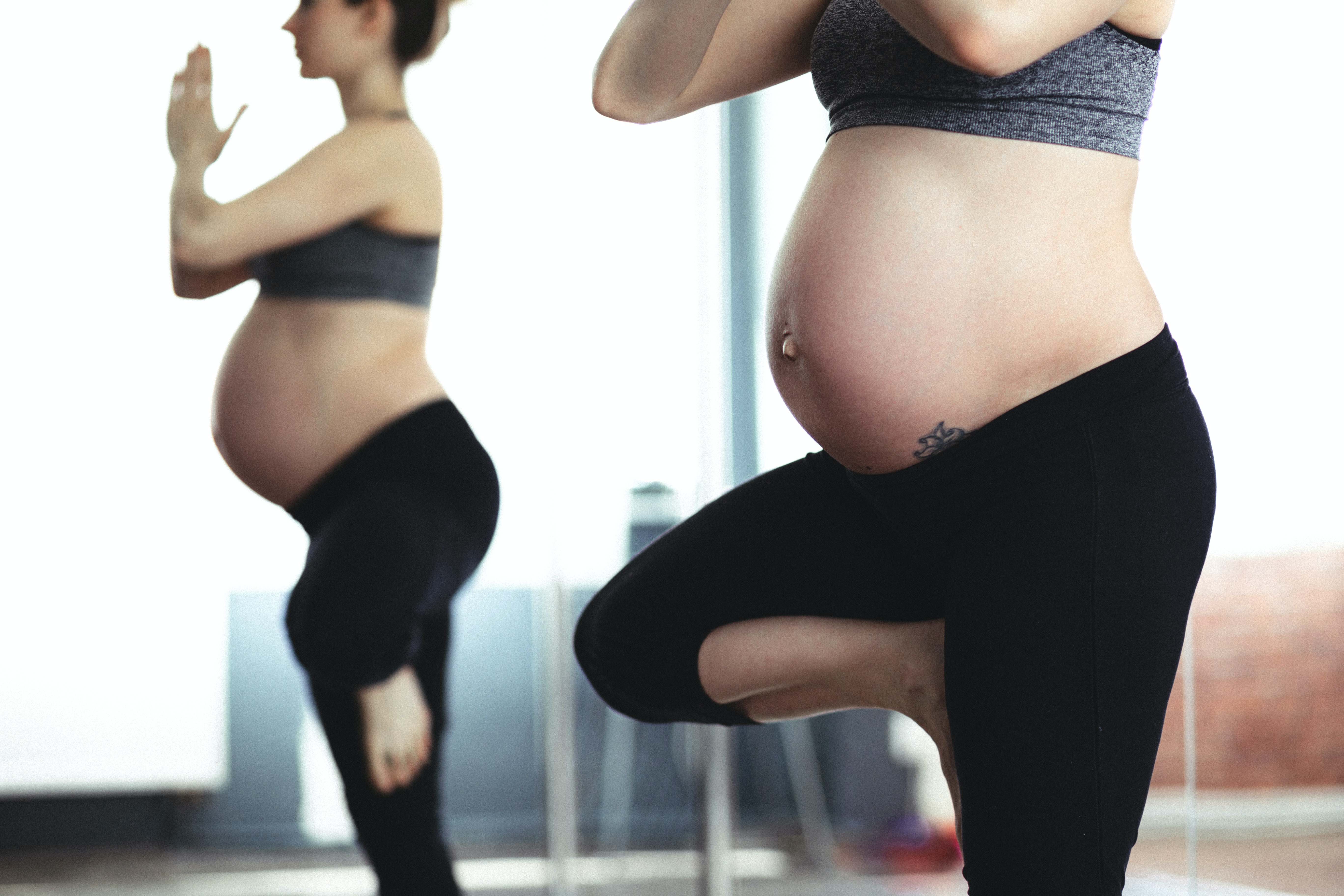08 September 2021 | News, Science
Food supplements and pregnancy: the essential micro- and macro-nutrients

Keeping up a healthy and balanced diet during pregnancy is the first fundamental rule to stay healthy during such a delicate time, because it is through diet that the mother can meet both her and her baby’s nutritional needs.
Energy needs during pregnancy
Let’s start with dispelling a myth: it is not true that during pregnancy the mother has to eat for two! In fact, it is enough to just slightly increase the number of calories consumed each day. This increase should also happen as gradually as possible.
In the first term of pregnancy, as the weight gain is minimal, the expectant mother really does not need to increase her energy intake. From the second term, to support foetus growth, if the woman is normal weight, a daily intake increase is needed of around 200 kcal, to reach an overall calorie intake of 2000-2400 kcal daily. On the other hand, what should never change are the proportions of the various macro-nutrients introduced daily during meals, which should remain in the ratios of approximately 50% carbohydrates, 30% lipids and 20% proteins.
A healthy pregnancy: which macro- and micro-nutrients are essential?
As we have seen, during the nine months of pregnancy we shouldn’t worry so much about calorie intake, but rather the quality of the food we eat: in fact, there are macro- and micro-nutrients that should always be part of the diet of a pregnant woman. But which nutritional elements are needed both for the well-being of the mother and the growth of the foetus? And when is it a good idea to use food supplements specifically formulated for pregnancy?

In the case of carbohydrates these should ideally be those with a low glycaemic index, such as pasta, rice and legumes, while sugars from sweets should be avoided to reduce the risk of gestational diabetes. As regards proteins, it is good practice to alternate all the main sources, such as dairy food, eggs, fish and meat. Special care should be taken in the case of the lipid component: it is better to restrict the intake of saturated fats such as butter, opting for the healthier extra virgin olive oil.
Other essential elements are the polyunsaturated fatty acids in the Omega-3 series, in particular DHA, which is found in abundance in fish, and which contributes to the cerebral and visual growth of the foetus, as well as having known benefits also for the mother, above all to reduce the risk of postpartum depression. The Italian Ministry of Health recommends an intake of at least 200 mg daily of DHA throughout pregnancy and breastfeeding, preferably as an extract from marine microalgae: the use of a vegetable source such as algae for the extraction of Omega-3 guarantees a high concentration of DHA, avoiding the unpleasant smell and taste of the fish, as well as the risk of contamination by heavy metals.
Micro-nutrients such as vitamins and minerals also play a key role during pregnancy, acting in essential processes both for the foetus and the mother. The Nutrient Reference Intake Levels tables show specific values for pregnant women.
Among all vitamins an extremely important one is B9, better known as folic acid. A deficiency of folic acid in the first few days of pregnancy can lead to defects in the formation of the neural tube, with serious consequences for foetus development. For this reason gynaecologists recommend starting with supplements of around 400 μg of folic acid daily even before conception, and to continue for at least the first term of pregnancy.
The need for vitamin D and calcium also increases significantly during pregnancy, as these are necessary to develop the skeletal structure of the foetus and to keep the mother’s bones healthy.

In this delicate period, the increase in blood volume and consequently increased production of red blood cells require a higher intake of iron, which would be difficult to achieve exclusively through normal diet. For this reason, iron-based supplements are highly recommended during pregnancy, often in combination with vitamins and folates. Iron is not only essential for the normal cognitive development of the child, but it also contributes to the transfer of oxygen to tissues, and is therefore essential for the placenta and for the foetus in rapid growth. Lastly, iron plays a vital role in maintaining the energy metabolism and normal function of the immune system, and therefore is fundamental for the health of pregnant women.
The regular intake of iodine is also an important factor, as this mineral is involved in the control of processes of organ and tissue morphogenesis, as well as temperature regulation and the metabolism of macro-nutrients.
Nutritional needs during breastfeeding: what changes compared to the pregnancy phase?
Nutritional needs during breastfeeding increase even more than during pregnancy: in fact, we need to bear in mind that the production of milk is linked to a significant amount of calories being burned, which on the one hand helps the mother work off reserves accumulated during 9 months of pregnancy, but on the other requires an increased intake of nutrients to meet the needs of the nursing infant.
More specifically, to produce 800 mL of breast milk (the amount that generally covers the daily need of the baby) around 670 kcal is needed, and therefore, also considering the fat deposits of the mother, a dietary regime is recommended with an extra intake of around 500 kcal daily.
But what is more important, as mentioned in the case of pregnancy, is focus on the quality of the diet followed, in order to ensure that the infant receives all the macro- and micro-nutrients essential for development. So, this means a preference for foods rich in proteins, such as milk, meat, fish and eggs, while carbohydrates, lipids, fruit and above all vegetables are also essential. There are no prohibited foods while breastfeeding, but it would be better to restrict consumption of sweets, fried food and foods containing too much fat, as well as spicy food that may alter the taste of the milk.
During this phase, the same minerals mentioned for pregnancy remain vital, such as calcium, phosphorus and iron, as well as vitamins such as folic acid, important for the development of the newborn’s nervous system, vitamin C to strengthen the immune system and vitamin D for the formation of the skeletal system. Lastly, let’s not forget that the main ingredient of breast milk is water, and therefore while breastfeeding, it is recommended to drink at least 2.5 litres of water per day, to avoid the risk of dehydration.
Although a healthy and balanced diet should be enough to guarantee the intake of all necessary nutrients, often it is just not enough: poor dietary habits of the mother or the shortages of sufficiently fresh food can put at risk the optimal intake of nutrients for the baby. In these cases, the use of specially formulated supplements is recommended to meet nutritional needs of the mother and child in this very special time of life.
This article does not replace the advice of your gynecologist or family doctor. If you are pregnant, or you are planning a pregnancy, contact a doctor to receive more information about this subject.
